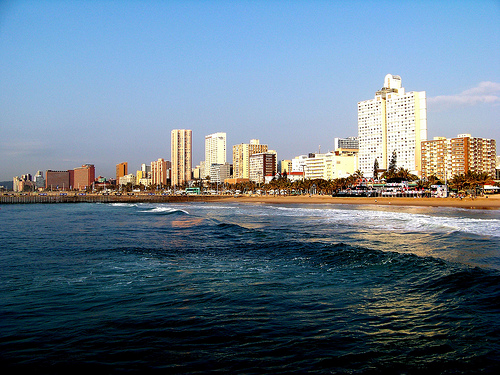Dickinson to Durban » Entries tagged with "Nelson Mandela"
Durban: Where Global Meets Local

Claire Tighe ’13 Durban, South Africa is the host for the 2011 UNFCCC 17th Conference of the Parties. As a large urban center and coastal city, has Durban taken any actions towards mitigation or adaptation to climate change? Debra Roberts addresses this question in her report, “Thinking globally, acting locally – institutionalizing climate change at the local government level in Durban, South Africa.” As of late, “reasonable progress has been made in Durban in mainstreaming climate change … Read entire article »
Filed under: Climate Change, Environmental Politics
Tactics of Last Resort: From Peaceful to Violent Protest
Mandela had long supported non-violent protest against apartheid. In 1961, however, he co-founded the MK to act as the armed wing of the African National Congress (ANC). He arrived at this striking reversal in methods only because it was forced upon him. Events like the Sharpeville Massacre, where police used lethal force on peaceful protesters, and the banning of the ANC in 1960 convinced Mandela that the anti-apartheid movement was at risk of utter defeat unless it resorted to violence. Despite the circumstances, Mandela was committed to avoiding any human casualties in his new efforts. Thus, he planned to begin with acts of sabotage that targeted buildings rather than people. This was an important strategic decision, as it would undermine the power of the system without brining condemnation upon them for … Read entire article »
Filed under: Summer Reading Responses
Learning Democracy and Equality in Suppressed South Africa
How did Mandela’s childhood and education impact his political philosophy? Nelson Mandela is a prime example of a person who has always had the courage and strength to follow what he believes is right. Certain aspects of his political philosophy have never wavered no matter the time or date. The main focus is on the importance of democracy and equality among all South Africans as well as across the rest of the world. Looking back on his childhood, it is obvious that gradual changes throughout his life made Mr. Mandela who he is today. Even before he was old enough to understand, his father was a leading role model for his belief in equality and democracy. Mr. Mandela’s father was a chief but lost his chieftainship when a dispute arises between Mr. … Read entire article »
Filed under: Summer Reading Responses
Resorting to Violence: Did the ANC have a choice?
Explain the reasons behind the creation of Umkhonto we Sizwe (MK). Do you think adopting violence as a method strengthened or weakened the anti-apartheid movement? Adopting violence as the movement’s revised strategy after almost fifty years of preaching nonviolent resistance was undoubtedly a complicated decision with immense ramifications. On one hand, the choice to use violence demonstrated to ANC supporters that nonviolence could not destroy Apartheid which is demoralizing. It showed that they were not strong and united enough to conquer violence without partaking in it. On the other hand, the ANC simply did not have a choice. They would not achieve their vision of a free state for all people without using more aggressive means to achieve it. Due to the force of the National Party, violence did strengthen the … Read entire article »
Filed under: Summer Reading Responses
Recent Comments